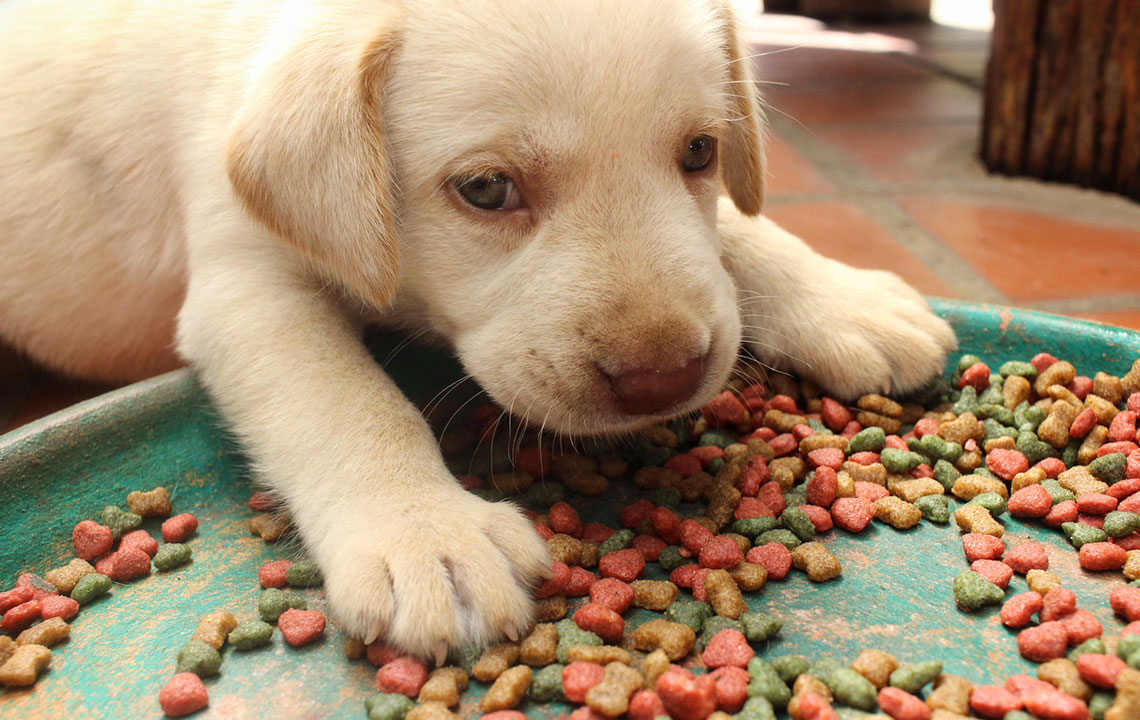Six Factors to Consider Before Buying Puppy Food
It can be difficult and daunting to choose the best puppy food for your furry bundle of joy, especially if it is your first time. There are a variety of dog food brands in the market, which makes choosing the right one confusing.
An eight-week-old puppy needs to consume twice as many calories every day as compared to an adult dog. Also, they need a lot more of nutrients like calcium, fat, protein, and phosphorus. So, it is essential to ensure that your puppy gets the right amount of nutrition it needs as too much or too little of it can cause problems.

Foods that are specifically designed for puppies ensure that the right calcium and phosphorus ratio is maintained, along with the amount of protein and number of calories.
Know how often to feed your pup
Similar to babies, puppies start out by consuming small meals a day that are formulated based on their calories and nutrition needs. Most of the puppies don’t finish their meals quickly. So, in order to inculcate that habit, you have to ensure that you feed the pup at regular times in regular portions. This will ensure that the caloric and nutritional need is met. Also, avoid placing a feeding window of more than 10 to 20 minutes.
Enquire about what your puppy used to eat
It can be scary and stressful for your puppy to adapt to a new home and family. Enquire about what your puppy used to eat while bringing it home as a sudden change in his diet can cause diarrhea. In the initial days, ensure that you feed the pup familiar type of dog food in order to avoid any digestion problems. Also, the vet may advise some specific foods for your pet in order to ensure that he gets the nutrition needed without causing any health problems.
Track the weight and growth of your pup
There are many weight and growth charts available online where you can track the progress of your pup and compare it to the average growth and weight of the same breed. This can help you to know the adjustments you need to make in the dietary habits and intake to achieve an average rate of growth.
The quantity of puppy food
When you are feeding your puppy, it is essential to observe how he is responding toward the puppy food. Focus on the condition of the puppy’s body and the amount of food he is eating or leaving behind in the bowl because this helps in determining the right portion size. The portion sizes tend to vary based on the individual puppy’s metabolism, the size of his body, and the nutritional requirement. If the puppy is skipping food or picking food occasionally, it may simply mean that he is either not hungry or is already full. The behavior of your puppy when food is offered, how much he eats, how much he leaves behind, and how often he skips his meals or picks food will help in determining the quantity of food you need to serve him.
The type of puppy food to feed
When you are deciding the type of food you want to feed your puppy it can be confusing whether to feed it dry food, wet food, or a combination of both. For both the small-breed and large-breed puppies, the puppy food companies incorporate special formulas by working with canine-nutrition scientists.
- Kibble – It is the most economical option available and the most popular brands offer a balanced and wholesome diet for pups of all sizes. It is easy to feed dry food as you simply have to feed it from the bag,
- Canned foods – Canned food is an expensive option and is often palatable for most dogs. Your pet needs to have a balanced diet fulfilling all it is nutritional required and it is essential to be careful about the foods that read “all-meat”.
- Semi-moist food – These are the ones that make you feel you are feeding your pup hamburgers because they usually look like one. They are usually available in one-serving packs.
There is an advantage of opting for hard kibble as these cause friction that helps in keeping the teeth and gums of your pup healthy and promotes oral hygiene. You can use water or wet food to moisten kibble to add more taste to the food.
Ensure that you read the labels
One of the essential factors to ensure that your dog is consuming good food is to read the labels. Read the labels of the food that you are buying and anything that seems unknown or sounds misleading, research about the same on the web or consult the vet. Some of the basic information that is mentioned on the labels includes the product name, the name of the manufacturer, statement of nutritional adequacy, guaranteed analysis, the list of ingredients the food consists, and feeding guidelines.

